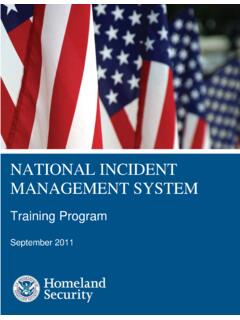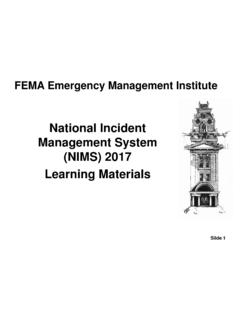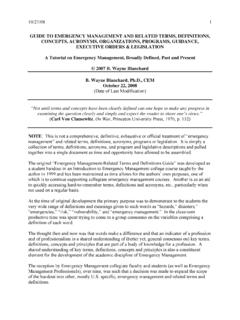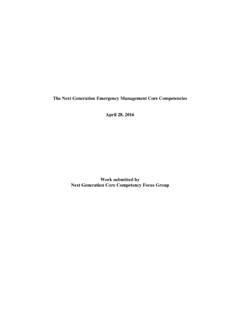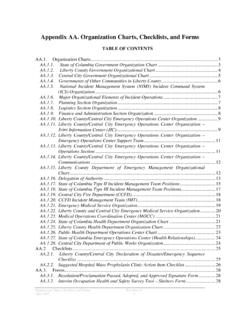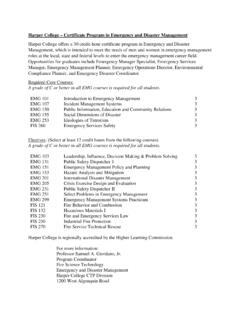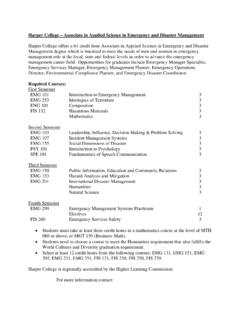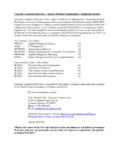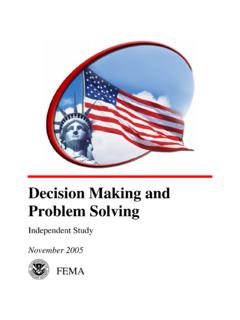Transcription of The Status of Theory in Emergency Management
1 The Status of Emergency Management Theory : Issues, Barriers, and Recommendations for Improved Scholarship Paper Presented at the FEMA Higher Education Conference June 8, 2004, Emmitsburg, MD David A. McEntire Emergency Administration and Planning Department of Public Administration University of North Texas Box 310617 Denton, Tx 76203-0617 A massive transformation is taking place in Emergency Management right now. For good or for bad, the September 11, 2001 terrorist attacks on the United States have resulted in a significant reformulation of the purpose and nature of Emergency Management . Terrorism has become the hazard of priority among those making policy decisions. The establishment of the Department of Homeland Security, with the incorporation of the Federal Emergency Management Agency, amounts to the most sweeping reorganization of government over the past five decades.
2 Emergency managers have obtained a long-overdue (but still incomplete) recognition from the general public while politicians and legislators have increased funding for the profession to historic levels. The field is also being positively and negatively affected by recent technological developments such as GIS and further industrialization. In addition, training and educational opportunities are providing a more knowledgeable cadre of professionals to meet the future challenges that will inevitably result from further urbanization and modern infrastructure. The demands placed on Emergency managers have risen, but there are also other stakeholders that desire to contribute to the goals of disaster prevention and preparedness. Emergency Management still retains vestiges of the past of course.
3 But it is, nonetheless, dramatically different than it was in prior years. In some ways, similar changes are occurring in disaster scholarship and in Emergency Management research. Our views about the causes of disasters have shifted, and we now more fully understand the plethora of variables that contribute to their occurrence. The lessons from Sociology and Geography remain as important as ever, but 1other disciplines are generating vital contributions to the research literature. Revolutionary paradigms have been proposed and others have been introduced as a way to integrate them with the perspectives of the past. Although there are many issues and functions that are understudied, the knowledge base in Emergency Management is expanding at a dramatic pace.
4 It is very interesting to see academic efforts in this area evolve, even though there are many obstacles yet to be overcome. The following paper will assess the Status of Emergency Management Theory in the context of the ever-changing practical and academic environments. It will discuss whether or not Theory is something that should be aspired to among scholars in Emergency Management . The barriers preventing theoretical development will then be identified as will some of the central concepts and paradigms for the emerging discipline. The paper will finally present this author s views on how to improve understanding of Emergency Management in the future and highlight conclusions drawn from a session devoted to Emergency Management Theory at the FEMA Higher Education Conference in June 2004.
5 Before so doing, the paper will briefly discuss what is meant by the term Theory . What is Theory ? The term Theory conjures up divergent opinions among scholars. However, it is necessary to acknowledge that the reason for this disagreement is probably due to the fact that Theory may have multiple meanings. In one sense, Theory may refer to the ideal or preferred conditions that academics are trying to promote in the world around us. We see the oftentimes disturbing circumstances around us, and we desire a better situation one that is free from the problems and mistakes that continually confront us. In the Emergency Management realm, for instance, we note a trend of rising disaster losses and frequently witness uncoordinated and haphazard response and recovery operations.
6 Therefore, our desired objectives are to reduce the probability or impact of disaster, and improve post-disaster functions should one of these deadly, destructive and disruptive events take place. Another meaning of Theory relates to the entire body of knowledge available in the given discipline. It is difficult to say if such a system of information exists in Emergency Management and what that entails since the field is relatively new and because it intersects with so many other academic disciplines. Regardless, such a collection of philosophy, data and research findings is based on a number of components that help to generate Theory . These building blocks include definitions, concepts, principles, classifications, typologies, models and causal relationships.
7 One of the major purposes of Theory is to clarify terms by providing sound academic definitions. In order to convey information and knowledge in any meaningful way, it is evident that issues and phenomena must be accurately and adequately defined. As an example, if there were no general consensus on what a hazard is, we would not be able to understand disasters nor explain how hazards relate to other terms such as vulnerability. Without clarity on this subject, a discussion about different types of hazards ( , natural, technological, civil) would be impossible or unproductive. Definitions are thus required if knowledge is to be generated and if links are to be found among various topics and variables. 2 Theory is also equated frequently to concepts, which are heuristic devices that enable understanding.
8 Concepts create mental images of things or activities in the minds of those who speak, read or hear about them. The concept of convergence is of paramount importance in Emergency Management . It implies that people and donations flow to the scene of disaster. This concept helps students recognize that the arrival of human and material resources may help responders deal with the demands made evident by disasters. Alternatively, the notion of convergence may foster recognition of new problems that are created as Emergency managers try to harness the skills of volunteers or coordinate the flow of goods and services. Other important concepts are emergence and governmental integration (horizontal and vertical). Without concepts, it would be extremely challenging to ensure comprehension of disaster behavior and foster increased professionalism in the field.
9 Theory may imply principles that promote ethics and standards in a particular field of study or profession. There are numerous examples of such principles in disaster studies. A popular one is heard in many different contexts: an ounce of prevention is better than a pound of cure. Kreps (1991) has also suggested that preparedness before a disaster and improvisation in the aftermath are the twin foundations in Emergency Management . Principles are consequently related to the ideal or preferred conditions mentioned earlier, but they are generally more limited in scope or applicability. Classifications, or illustrations of comparison, are likewise synonymous with Theory . Classifications are useful to show the differences among similar types of phenomena.
10 In Emergency Management , scholars are interested in accidents, crises, emergencies, disasters, catastrophes and calamities. However, these subjects are different due to the number of deaths produced, extent of geographical impact, degree of social disruption, etc. Classifications are thus helpful to show why one issue has more or less of one variable than another. Conveying the degree or extent of phenomena is a major part of any scientific enterprise. Typologies, which are organized categorizations, have a close relationship to Theory . Typologies are similar to classifications in that they are useful for the purpose of comparison. But, whereas classifications typically deal with similar phenomena, typologies mainly focus on different issues. Perhaps the most renown typology in Emergency Management research emanates from the Disaster Research Center (see Dynes 1970).

